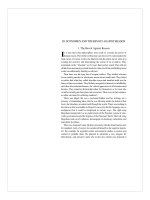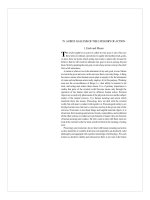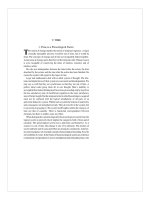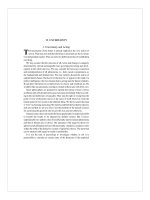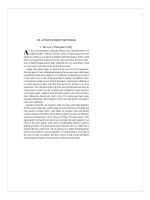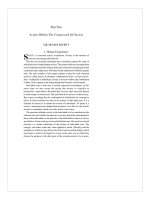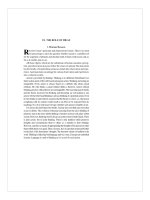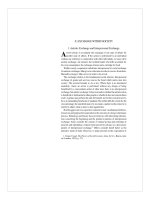Luận án kinh tế - "Human and action" - Chapter 4 docx
Bạn đang xem bản rút gọn của tài liệu. Xem và tải ngay bản đầy đủ của tài liệu tại đây (19.63 KB, 7 trang )
IV. A FIRST ANALYSIS OF THE CATEGORY OF ACTION
1. Ends and Means
T
HE result sought by an action is called its end, goal, or aim. One uses
these terms in ordinary speech also to signify intermediate ends, goals,
or aims; these are points which acting man wants to attain only because he
believes that he will reach his ultimate end, goal or aim in passing beyond
them. Strictly speaking the end, goal, or aim of any action is always the relief
from a felt uneasiness.
A means is what serves to the attainment of any end, goal, or aim. Means
are not in the given universe; in this universe there exist only things. A thing
becomes a means when human reason plans to employ it for the attainment
of some end and human action really employs it for this purpose. Thinking
man sees the serviceableness of things, i.e., their ability to minister to his
ends, and acting man makes them means. It is of primary importance to
realize that parts of the external world become means only through the
operation of the human mind and its offshoot, human action. External
objects are as such only phenomena of the physical universe and the subject
matter of the natural sciences. It is human meaning and action which
transform them into means. Praxeology does not deal with the external
world. but with man’s conduct with regard to it. Praxeological reality is not
the physical universe, but man’s conscious reaction to the given state of this
universe. Economics is not about things and tangible material objects; it is
about men, their meanings and actions. Goods, commodities, and wealth and
all the other notions of conduct are not elements of nature; they are elements
of human meaning and conduct. He who wants to deal with them must not
look at the external world; he must search for them in the meaning of acting
men.
Praxeology and economics do not deal with human meaning and action
as they should be or would be if all men were inspired by an absolutely valid
philosophy and equipped with a perfect knowledge of technology. For such
notions as absolute validity and omniscience there is no room in the frame
of a science whose subject matter is erring man. An end is everything which
men aim at. A means is everything which acting men consider as such.
It is the task of scientific technology and therapeutics to explode errors
in their respective fields. It is the task of economics to expose erroneous
doctrines in the field of social action. But if men do not follow the advice of
science, but cling to their fallacious prejudices, these errors are reality and
must be dealt with as such. Economists consider foreign exchange control
as inappropriate to attain the ends aimed at by those who take recourse to it.
However, if public opinion does not abandon its delusions and governments
consequently resort to foreign exchange control, the course of events is
determined by this attitude. Present-day medicine considers the doctrine of
the therapeutic effects of mandrake as a fable. But as long as people took
this fable as truth, mandrake was an economic good and prices were paid
for its acquisition. In dealing with prices economics does not ask what things
are in the eyes of other people, but only what they are in the meaning of
those intent upon getting them. For it deals with real prices, paid and received
in real transactions, not with prices as they would be if men were different
from what they really are.
Means are necessarily always limited, i.e., scarce with regard to the
services for which man wants to use them. If this were not the case, there
would not be any action with regard to them. Where man is not restrained
by the insufficient quantity of things available, there is no need for any
action.
It is customary to call the end the ultimate good and the means goods. In
applying this terminology economists mainly used to think as technologists
and not as praxeologists. They differentiated between free goods and eco-
nomic goods. They called free goods those things which, being available in
superfluous abundance, do not need to be economized. Such goods are,
however, not the object of any action. They are general conditions of human
welfare; they are parts of the natural environment in which man lives and
acts. Only the economic goods are the substratum of action. They alone are
dealt with in economics.
Economic goods which in themselves are fitted to satisfy human wants
directly and whose serviceableness does not depend on the cooperation of other
economic goods, are called consumers’ goods or goods of the first order. Means
which can satisfy wants only indirectly when complemented by cooperation of
other goods are called producers’ goods or factors of production or goods of a
remoter or higher order. The services rendered by a producers’ good consist
A FIRST ANALYSIS OF THE CATEGORY OF ACTION 93
in bringing about, by the cooperation of complementary producers’ goods,
a product. This product may be a consumers’ good; it may be a producers’
good which when combined with other producers’ goods will finally bring
about a consumers’ good. It is possible to think of the producers’ goods as
arranged in orders according to their proximity to the consumers’ good for
whose production they can be used. Those producers’ good which are
nearest to the production of a consumers’ good are ranged in the second
order, and accordingly those which are used for the production of goods of
the second order in the third order and so on.
The purpose of such an arrangement of goods in orders is to provide a
basis for the theory of value and prices of the factors of production. It will
be shown later how the valuation and the prices of the goods of higher orders
are dependent on the valuation and the prices of the goods of lower orders
produced by their expenditure. The first and ultimate valuation of external
things refers only to consumers’ goods. All other things are valued according
to the part they play in the production of consumers’ goods.
It is therefore not necessary actually to arrange producers’ goods in
various orders from the second to the nth. It is no less superfluous to enter
into pedantic discussions of whether a concrete good has to be called a good
of the lowest order or should rather be attributed to one of the higher orders.
Whether raw coffee beans or roast coffee beans or ground coffee or coffee
prepared for drinking or only coffee prepared and mixed with cream and
sugar are to be called a consumers’ good ready for consumption is of no
importance. It is immaterial which manner of speech we adopt. For with
regard to the problem of valuation, all that we say about a consumers’ good
can be applied to any good of a higher order (except those of the highest
order) if we consider it as a product.
An economic good does not necessarily have to be embodied in a tangible
thing. Nonmaterial economic goods are called services.
2. The Scale of Value
Acting man chooses between various opportunities offered for choice.
He prefers one alternative to others.
It is customary to say that acting man has a scale of wants or values in his
mind when he arranges his actions. On the basis of such a scale he satisfies what
is of higher value, i.e., his more urgent wants, and leaves unsatisfied what is of
lower value, i.e., what is a less urgent want. There is no objection to such a
94 HUMAN ACTION
presentation of the state of affairs. However, one must not forget that the
scale of values or wants manifests itself only in the reality of action. These
scales have no independent existence apart from the actual behavior of
individuals. The only source from which our knowledge concerning these
scales is derived is the observation of a man’s actions. Every action is always
in perfect agreement with the scale of values or wants because these scales
are nothing but an instrument for the interpretation of a man’s acting.
Ethical doctrines are intent upon establishing scales of value according
to which man should act but does not necessarily always act. They claim for
themselves the vocation of telling right from wrong and of advising man
concerning what he should aim at as the supreme good. They are normative
disciplines aiming at the cognition of what ought to be. They are not neutral
with regard to facts; they judge them from the point of view of freely adopted
standards.
This is not the attitude of praxeology and economics. They are fully aware
of the fact that the ultimate ends of human action are not open to examination
from any absolute standard. Ultimate ends are ultimately given, they are
purely subjective, they differ with various people and with the same people
at various moments in their lives. Praxeology and economics deal with the
means for the attainment of ends chosen by the acting individuals. They do
not express any opinion with regard to such problems as whether or not
sybaritism is better than asceticism. They apply to the means only one
yardstick, viz., whether or not they are suitable to attain the ends at which
the acting individuals aim.
The notions of abnormality and perversity therefore have no place in
economics. It does not say that a man is perverse because he prefers the
disagreeable, the detrimental, and the painful to the agreeable, the beneficial,
and the pleasant. It says only that he is different from other people; that he
likes what others detest; that he considers useful what others want to avoid;
that he takes pleasure in enduring pain which others avoid because it hurts
them. The polar notions normal and perverse can be used anthropologically
for the distinction between those who behave as most people do and
outsiders and atypical exceptions; they can be applied biologically for the
distinction between those whose behavior preserves the vital forces and
those whose behavior is self-destructive; they can be applied in an ethical
sense for the distinction between those who behave correctly and those who
act otherwise than they should. However, in the frame of a theoretical
science of human action, there is no room for such a distinction. Any
A FIRST ANALYSIS OF THE CATEGORY OF ACTION 95
examination of ultimate ends turns out to be purely subjective and therefore
arbitrary.
Value is the importance that acting man attaches to ultimate ends. Only
to ultimate ends is primary and original value assigned. Means are valued
derivatively according to their serviceableness in contributing to the attain-
ment of ultimate ends. Their valuation is derived from the valuation of the
respective ends. They are important for man only as far as they make it
possible for him to attain some ends.
Value is not intrinsic, it is not in things. It is within us; it is the way in
which man reacts to the conditions of his environment.
Neither is value in words and doctrines. It is reflected in human conduct.
It is not what a man or groups of men say about value that counts, but how
they act. The oratory of moralists and the pompousness of party programs
are significant as such. But they influence the course of human events only
as far as they really determine the actions of men.
3. The Scale of Needs
Notwithstanding all declarations to the contrary, the immense majority of
men aim first of all at an improvement of the material conditions of well-being.
They want more and better food, better homes and clothes, and a thousand other
amenities. They strive after abundance and health. Taking these goals as given,
applied physiology tries to determine what means are best suited to provide as
much satisfaction as possible. It distinguishes, from this point of view, between
man’s “real” needs and imaginary and spurious appetites. It teaches people how
they should act and what they should aim at as a means.
The importance of such doctrines is obvious. From his point of view the
physiologist is right in distinguishing between sensible action and action
contrary to purpose. He is right in contrasting judicious methods of nourish-
ment from unwise methods. He may condemn certain modes of behavior as
absurd and opposed to “real” needs. However, such judgments are beside
the point for a science dealing with the reality of human action. Not what a
man should do, but what he does, counts for praxeology and economics.
Hygiene may be right or wrong in calling alcohol and nicotine poisons. But
economics must explain the prices of tobacco and liquor as they are, not as
they would be under different conditions.
There is no room left in the field of economics for a scale of needs
different from the scale of values as reflected in man’s actual behavior.
96 HUMAN ACTION
Economics deals with real man, weak and subject to error as he is, not with
ideal beings, omniscient and perfect as only gods could be.
4. Action as an Exchange
Action is an attempt to substitute a more satisfactory state of affairs for
a less satisfactory one. We call such a willfully induced alteration an
exchange. A less desirable condition is bartered for a more desirable. What
gratifies less is abandoned in order to attain something that pleases more.
That which is abandoned is called the price paid for the attainment of the
end sought. The value of the price paid is called costs. Costs are equal to the
value attached to the satisfaction which one must forego in order to attain
the end aimed at.
The difference between the value of the price paid (the costs incurred)
and that of the goal attained is called gain or profit or net yield. Profit in this
primary sense is purely subjective, it is an increase in the acting man’s
happiness, it is a psychical phenomenon that can be neither measured nor
weighed. There is a more and a less in the removal of uneasiness felt; but
how much one satisfaction surpasses another one can only be felt; it cannot
be established and determined in an objective way. A judgment of value
does not measure, it arranges in a scale of degrees, it grades. It is expressive
of an order of preference and sequence, but not expressive of measure and
weight. Only the ordinal numbers can be applied to it, but not the cardinal
numbers.
It is vain to speak of any calculation of values. Calculation is possible
only with cardinal numbers. The difference between the valuation of two
states of affairs is entirely psychical and personal. It is not open to any
projection into the external world. It can be sensed only by the individual.
It cannot be communicated or imparted to any fellow man. It is an intensive
magnitude.
Physiology and psychology have developed various methods by means
of which they pretend to have attained a substitute for the unfeasible
measurement of intensive magnitudes. There is no need for economics to
enter into an examination of these rather questionable makeshifts. Their
supporters themselves realize that they are not applicable to value judg-
ments. But even if they were, they would not have any bearing on economic
problems. For economics deals with action as such, and not with the
psychical facts that result in definite actions.
It happens again and again that an action does not attain the end sought.
A FIRST ANALYSIS OF THE CATEGORY OF ACTION 97
Sometimes the result, although inferior to the end aimed at, is still an
improvement when compared with the previous state of affairs; then there
is still a profit, although a smaller one than that expected. But it can happen
that the action produces a state of affairs less desirable than the previous
state it was intended to alter. Then the difference between the valuation of
the result and the costs incurred is called loss.
98 HUMAN ACTION


